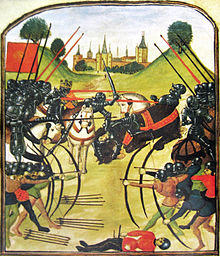Wars of the Roses
The Wars of the Roses (1455–1489), known contemporaneously as the Cousin's War, were a series of fifteenth-century English civil wars fought over control of the throne of England, between supporters of two rival cadet branches of the royal House of Plantagenet: the House of Lancaster, represented by a red rose, and the House of York, represented by a white rose. Eventually, the wars eliminated the male lines of both families leading to the end of the Plantagenet reign and subsequent rise of the Tudor Dynasty.



Quotes
edit- I know of no one in the realm who would not more fitly to come to me than I to him.
- Richard Plantagenet, Duke of York when asked in Parliament if he would be willing to appear before the Lancastrian King Henry VI, 10 October 1460, quoted in The Encarta Book of Quotations, 2000.
- By God's blood, thy father slew mine, and so will I do thee and all thy kin.
- The Lancastrian Lord Clifford, on the slaying of Yorkist Edmund, Earl of Rutland during the Battle of Wakefield, 30 December 1460. Reprinted in Paul Murray Kendall’s Richard the Third (1956)
- Who that woll make ony more lette hym seke other bookis kynge Arthure or of sir Launcelot and sir Trystrams; for this was drawen by a knyght presoner, sir Thomas Malleoré, that God send him good recover.
- Sir Thomas Malory at the end of the chapter The Tale of King Arthur of his larger work, written circa 1468-1470 while held in Newgate Prison as a captured partisan of the rebellious Earl of Warwick. Reprinted in Malory Works, edited by Eugene Vinaver, 1954.
- Men look after they wot not what, but men buy harness fast; the King's menial men and the Duke of Clarence's are many in this town.
- Sir John Paston on the eve of Clarence's rebellion, June 1471. Reprinted in Richard the Third (1956)
Somewhat musing
And more mourning,
In remembering
Th’unsteadfastness;
This world being
Of such wheeling,
Me contrarying,
What may I guess?I fear, doubtless,
Remediless
Is now to seize
My woeful chance;
For unkindness,
Withoutenless,
And no redress,
Me doth advance.With displeasure,
To my grievance,
And no surance
Of remedy;
Lo, in this trance,
Now in substance,
Such is my dance,
Willing to die.Methinks truly
Bounden am I,
And that greatly,
To be content;
Seeing plainly
Fortune doth wry
All contrary
From mine intent.My life was lent
Me to one intent.
It is nigh spent.
Welcome Fortune!
But I ne went
Thus to be shent
But she it meant:
Such is her won.- Anthony Woodville, Earl Rivers, written 23 June, 1483, on learning that he had been sentenced to die for treason by Richard, Duke of Gloucester (later King Richard III) Lord Protecter of England. Reprinted in Richard the Third (1956)
- The first thing we do, let's kill all the lawyers.
- Dick "The Butcher" in Shakespeare's Henry VI, Part 2, IV, ii
- England hath long been mad and scarred herself,
The brother blindly shed the brother’s blood,
The father rashly slaughtered his own son,
The son, compelled, been butcher to the sire;
All this divided York and Lancaster.- Henry Tudor's victory speech in Shakespeare's Richard III (c. 1592), V, v
- The joyning of the Red-Rose with the White,
Did set our State into a Damask plight.- Nathaniel Ward, Simple Cobler of Aggawam in America, 5th ed. (1713), p. 21
- Above, below, the rose of snow,
Twined with her blushing foe, we spread:
The bristled boar in infant-gore
Wallows beneath the thorny shade.- Thomas Gray, from The Bard: A Pindaric Ode (1757)